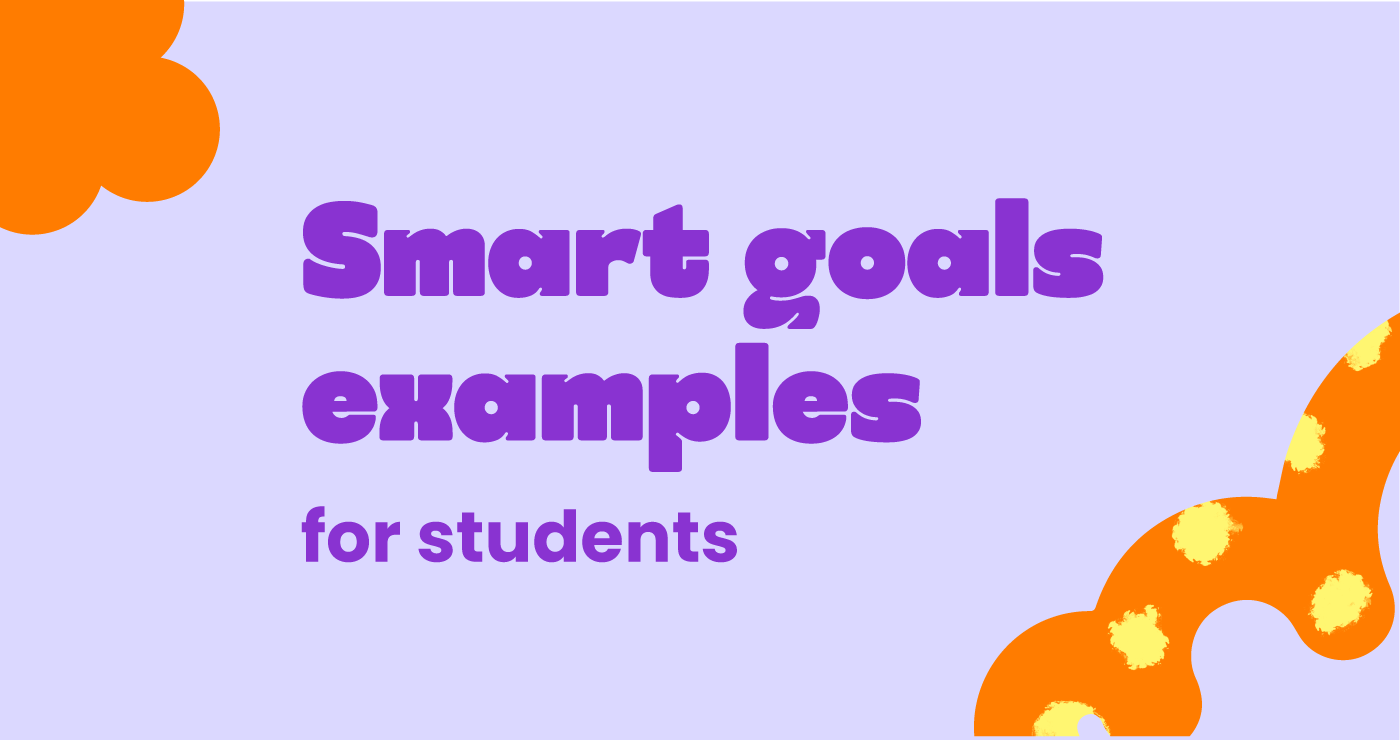What is a good goal for a student?
- Goal setting is a good practice for students of all ages to learn to set measurable goals, improve time management skills, and achieve milestones in their personal development. Good goals for students can be career goals, life goals, as well as personal goals.
What does the SMART acronym stand for?
- Let’s break down the SMART acronym to understand what each word means.
- Specific: a clearly identified end goal that the student can measure whether they have achieved or not.
- Measurable: a tangible goal that you can track progress to ensure you achieve.
- Achievable: a goal that you can complete but that also pushes you to improve, it cannot be too easy or too hard.
- Relevant: the short-term goal must help you complete your relevant long-term goal.
- Timebound: a specific deadline is needed to mark progress and completion of the smart goal.
What are good examples of SMART goals?
A good SMART goal would cover all of the above criteria. A SMART goal is the practice of goal setting with a specific goal that is attainable within a prescribed time period and is fundamentally relevant to your long-term goals.
A good SMART goal would be “I want to be in the top 5 in my class this year.” As opposed to, “I want to improve my academic performance.” Academic goals fit into the SMART goal definition smoothly as your students are graded periodically. Consequently setting good grades as an achievable goal creates an action plan for academic success. Please use the SMART goal template below for your students to coach them on how to set goals.
What are 9 example SMART goals for students?
1. Improve academic performance
“I will get a 4.0 GPA this semester.”
Specific: The goal is to get a 4.0 GPA for the year.
Measurable: The student can track their GPA progress on a report card or online portal throughout the year to monitor their own smart goal.
Achievable: The student might have achieved a 3.6 GPA last semester, so a 4.0 is definitely achievable if they work hard through the end of the school year.
Relevant: Improving their GPA is a relevant goal for the student’s future success and long-term goals if they wish to attend college.
Time-bound: This goal is for the year so they have a specific time frame to improve their GPA.
2. Improve Organization
“I will be more organized when submitting my assignments on time by setting aside one hour per week to note down all my upcoming due dates for the next week.”
Specific: The main goal is to submit assignments on time.
Measurable: There are clear steps, and one hour per week is an extra time commitment to improve organizational skills.
Achievable: One hour is a reasonable amount of time, and will help improve time management skills.
Relevant: The steps taken will serve the overall goal and help with personal development and accountability for school work.
Time-bound: This goal provides the opportunity for a weekly check-in.
3. Increase class participation
“I will contribute at least five times each week in class to a discussion or provide an answer to a question”
Specific: The clear objective is to contribute at least five times in class per week.
Measurable: Each time a question is answered, the student has demonstrated progress and commitment toward meeting their goal.
Achievable: The student will stay on top of their assigned reading, homework, etc in preparation for class.
Relevant: It’s an effective goal for becoming a better student and achieving good grades.
Time-bound: Each week provides an opportunity for benchmark
4. Learn another language
“I want to learn Spanish, so I’ve committed to spending 20 minutes a day outside of class completing an online program. In 4 months I want to be able to have a conversation in Spanish.”
Specific: Learning Spanish is a specific goal, as is the deadline.
Measurable: The amount of time spent in an independent study can easily be measured.
Achievable: Twenty minutes a day is achievable.
Relevant: The goal of learning a language is relevant to diversifying skills. For college students or applicants, it is a demonstrable extracurricular.
Time-bound: Online daily lesson time is easily trackable.
5. Improve academic performance
“I will get an A in my current essay in my English class.”
Specific: I specifically want to target English for improvement. The specific essay is the current one that has been assigned.
Measurable: The measurement for success is an A- or above.
Achievable: I achieved a B- in my previous essay so I believe I can increase one grade with enough extra time and by using my feedback from my previous essay.
Relevant: The goal of getting an A in my essay is relevant to my long-term goal of applying to college next year.
Time-bound: My essay is due in 7 weeks.
6. Improve reading level
“To expand my knowledge base, I will read X book(s) per month of extracurricular material. I will do this by reading for two hours on the weekends and 30 minutes daily.”
Specific: the target of a specific number of books per month is unambiguous.
Measurable: it is simple to demonstrate success if the student is able to reach the goal.
Achievable: when setting the goal the student can choose the appropriate number of books per month.
Relevant: reading is an excellent academic skill that will improve vocabulary and spelling. This will increase overall personal development and contribute to better grades.
Time-bound: at the end of the month it is clear whether the objective has been achieved.
7. Increase the amount of sleep
“By the end of next month, I will commit to getting at least 8 hours of sleep each night. I will do this by turning off my devices one hour before bed and practicing breathing exercises to fall asleep faster.
Specific: The goal is to get more sleep, preferably the recommended daily amount for 13-18-year-olds.
Measurable: Having a set bedtime and using an alarm, set for 8 hours later.
Achievable: Organizing the student’s activities and eliminating distractions make this goal achievable.
Relevant: Restful sleep is crucial for your brain and body to function at their highest level, increasing your ability to concentrate and potentially academic performance.
Time-bound: The routine gives the student time to get to know their schedule and work it to account for additional sleep.
8. Improve My Productivity
“I will improve my productivity by using a Pomodoro timer when studying and closing all other tabs on my computer. I will do this every time I study for 2 months.”
Specific: Use a Pomodoro timer every time I study.
Measurable: Will keep a diary measuring my progress.
Achievable: Study regularly and this is an add-on to an existing study program to improve productivity during my existing study time.
Relevant: Better study productivity can help me learn faster and get better grades.
Time-bound: The goal is to persist with the habit for 2 months.
9. Memorize 100 Flashcards Within 3 Weeks
“I will create a deck of 100 flashcards related to my history course and memorize all 100 dates within 3 weeks by spending 20 minutes per day on the task.”
Specific: The goal will be to learn the things that are specifically listed on the flashcards.
Measurable: I will be able to have a friend test me at the end of the 3 weeks to see my grade out of 100.
Attainable: It is reasonable to be able to memorize 100 facts in 3 weeks or about 5 words per day.
Relevant: Learning these words will make it easier for me to pass my history class.
Time-Based: I will meet this goal within 3 weeks.
Challenge your students with setting their own SMART goals
Remember that SMART goal setting will improve with practice. Long term goals will be achieved by ensuring students can break them down into achievable chunks within specific time frames. Ask your students; does your goal make sense? Is it clear and concise? Is the goal measurable? Is this goal challenging but not impossible? Will this goal help you achieve your long term goals? Have you allowed yourself a realistic amount of time to complete the goal?
Good luck using the SMART acronym with your students and maybe think about setting yourself some SMART goals!
You may also like

10 Fun Classroom Activities to Boost Student Engagement

10 Ways to Check for Student Understanding


